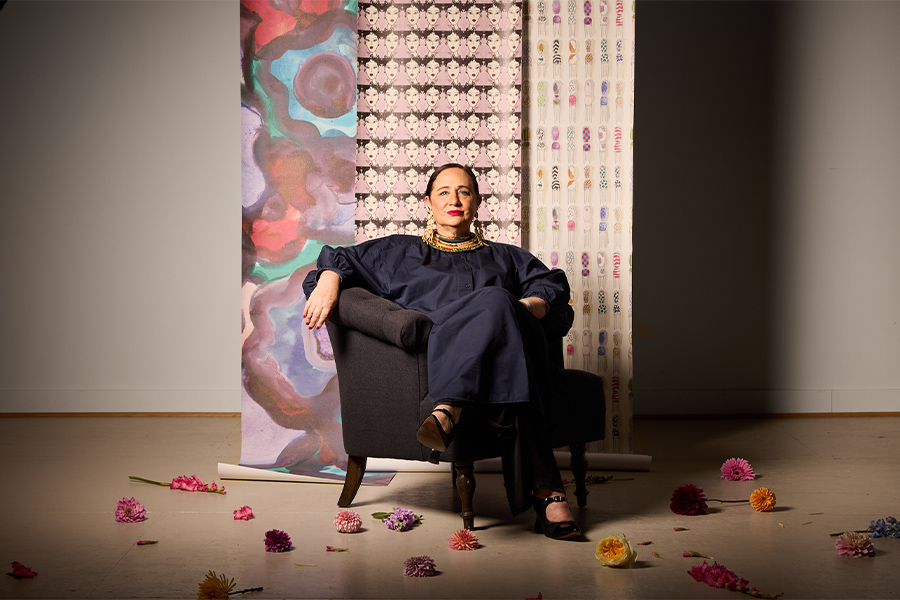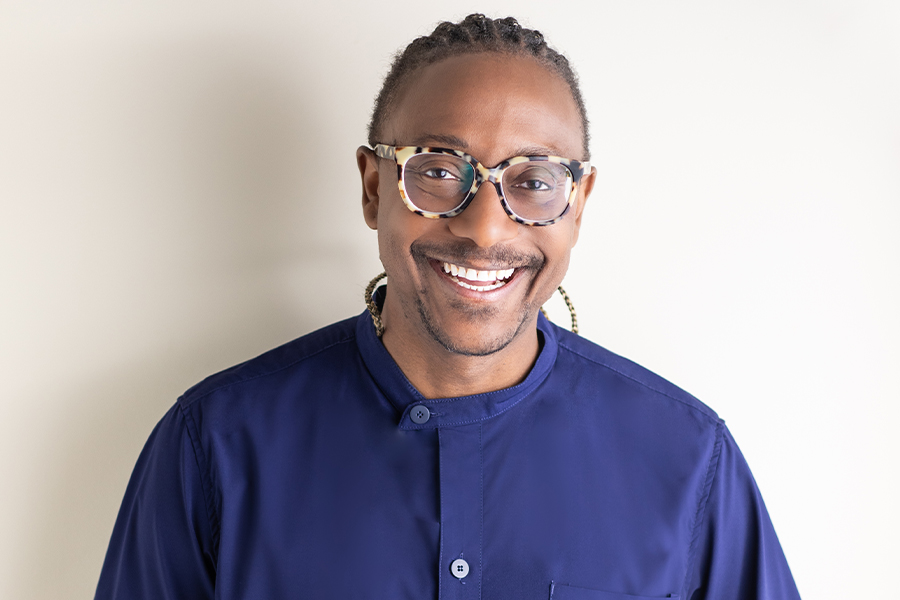Charlotte Gomez de Orozco
HOY, Paris
After the successful launch of Parisian wine and cocktail bar Le Gisou, Charlotte Gomez de Orozco started to recognize a number of environmental concerns within the service industry. “It made me more aware of the quantities you buy, how it’s delivered, the value and price of things, seasonality, everything you waste, and how little things done differently can change everything,” says the Mexico City-born entrepreneur, who was raised in France.
It also led to her yoga practice. “It brought me back to a simple and easy life,” she says. To expand on this holistic way of thinking, she and her mother overhauled the former Caravelle hotel into HOY (House of Yoga, and the word “today” in Spanish), a community- and yoga-based concept in Paris’ 9th arrondissement. The restrained aesthetic, crafted by de Orozco, mirrors a yoga barn in Bali, reflecting “how things can be beautiful without being overwhelming,” she says. “Everything had to be there for a reason.”
That starts with the simple material palette “that connects humans to the earth,” she says. Wood, concrete, pastel tones, and greenery weave a rustic authenticity through spaces populated with locally sourced and secondhand furniture, including in the 22 nature-inspired guestrooms. “We tried to go back to basics and propose to our clients an experience where they only have what they need,” she says.

HOY features materials like wood and concrete, paired with greenery and pastel hues
While the devout yogi envisioned a similarly mindful clientele, she also conceived a space for newcomers to open their hearts and minds. “I wanted people to stop sacralizing yoga,” she says. “Presenting yoga under different aspects, as a part of a hotel, restaurant, or flower shop, makes it more accessible to people.” To convey that mindset, HOY hosts five to six hours of yoga classes each day in various spaces throughout the property, including the kitchen.
“I wish we could be the first of many hotels to not be scared of thinking outside the box by proposing a different experience to our clients,” de Orozco says. “The more there are, the better.”
Liran Wizman
Sircle Collection, Amsterdam

“We are so much more than just a hotel company, and we needed a brand that would communicate that in a simple, clear way,” says Amsterdam-based hospitality entrepreneur Liran Wizman, owner and founder of Sircle Collection. He’s referring to the fact his company Europe Hotels Private Collection recently rebranded to Sircle to better reflect its mix of hotel, retail, F&B, and wellness offerings. The name—its spelling a nod to the collection’s original hotel brand, Sir—references the way “a circle brings things together. It never has an end; it’s continuous and flexible,” he says.
It’s been a period of growth for Wizman. Last year, he rolled out three properties, including the sixth Sir hotel outpost in Barcelona, the launch of a new Max Brown hotel in Vienna, as well as the refurbishment and repositioning of a historic site that’s now the Park Centraal Amsterdam hotel.
Part of what has set the Tel Aviv-born Wizman apart from his competitors is his keen ability to find design collaborators who share an interest in accentuating a building’s potential without losing its connection to the neighborhood. He recalls his projects with longtime partners Alon Baranowitz and Irene Kronenberg of Amsterdam firm Baranowitz + Kronenberg, who he says are like family to him. The partnership started with the Sir Albert in Amsterdam almost seven years ago and has evolved to include projects like the W Hotel in Amsterdam and two Sir properties in Spain, the Sir Victor and Sir Joan. “We have reached the stage where we finish each other’s sentences, and we still find moments to challenge one another,” he says.

ICRAVE’s edgy look for the Sir Adam includes exposed concrete pillars and floors in the lobby
Further, he points to his work with Piero Lissoni on the EDITION Milan—the Italian architect and designer’s first project in his hometown. “It’s an incredible building,” Wizman says of the forthcoming project, which is set to debut in 2022 with a restaurant from the Entourage Group, the hospitality company Wizman co-owns with Yossi Eliyahoo. “The 300-year-old palazzo was abandoned for so long and many locals don’t even know about it.”
Sites like that of the EDITION best embody the elevated experiences Wizman aims to provide. While the future remains uncertain, he is confident in the endurance of his brands. “We are all learning and have yet to define our longterm plans,” he says. “However, I feel that the hospitality industry will become more united than ever.”
Eric Jafari, Stephen McCall, and Nick Barton
Edyn, London

It’s not every day that a brand shifts the hospitality needle. Founded in 2016—and part of the recently rebranded Edyn family that encompasses SACO serviced apartments, the Moorgate, and the Wittenberg—Locke has transformed the perception of aparthotels.
Where once the category was mainly associated with the corporate traveler, the London-based brand carries the enviable lifestyle tag. At Locke’s four properties (two in London, one in Manchester, and one in Edinburgh), practical elements remain—the kitchenettes, ample storage, and ultra-fast wifi—but equally, there are locally minded bars and restaurants, in-house cultural programs, and coworking spaces that attract the city’s resident creatives, as well as those passing through.
“In my life before Locke, I spent a soul-destroying amount of time in hotels traveling for work, but they didn’t leave a lasting impression,” says CEO Stephen McCall. “Homogeny reigned over individuality. Locke is the antithesis of that.”
Chief commercial officer Nick Barton agrees: “Airbnb showed travelers an alternative to the cookie-cutter big brand hotels, allowing [guests] to ‘live like a local’ with freedom, independence, and a more accessible price point. However, all too often this model couldn’t offer consistently beautiful design or curated experiences.”

Grzywinski+Pons created a solarium feel in the reception and bar at Eden Locke in Edinburgh
Indeed, from the outset, design has been an important distinguisher for Locke. With its signature pastel color palette and biophilic elements, the group has cultivated a distinctive brand identity. “Locke was named after the 17th-century philosopher John Locke, who believed that when we’re born we are a blank canvas and that each experience we endure shapes who we are,” says chief development officer and creative director Eric Jafari. “Our business model is predicated on transforming small spaces into aspirational homes through thoughtful design. We tap designers who aren’t from the local area, asking them to get under the skin of the location and provide us with an interpretation.” The most frequent collaborator is New York-based studio Grzywinski+Pons, which has designed each property to date and helped define the brand’s signature aesthetic.
Circumstances permitting, this summer will see the opening of Bermonds Locke, close to the river Thames and the iconic Tower Bridge, bringing the tally of London properties to three. It will be crafted by local firm Holloway Li, in collaboration with Wanderlust, which was chosen in part because of the parallels between Bermondsey Street in London and Abbot Kinney Boulevard in Venice, California, where the studio is based. The pivot toward new design partnerships will continue with the AvroKO-helmed Beckett Locke in Dublin. It’s one of two upcoming properties in the Irish capital and part of a pipeline that will bring the number of openings in 2021 to six.

Yellow accents juxtapose the former cotton mill’s brick walls at Whitworth Locke in Manchester
With properties slated for cities including Munich, Lisbon, Berlin, and Copenhagen, the challenge is scaling with integrity. “We want to become a brand that guests know they can trust for a consistently high standard of rooms and living space at an affordable price point,” McCall says, “but with the varied design and programming that keeps things interesting.”
While these are precarious times, the future looks bright for Locke. In fact, real estate services provider Savills commissioned a 2019 study for the brand that found the average length of a London visitor’s stay is 5.8 days. Locke’s average is 10. “We anticipate that could increase even further in the wake of COVID-19, as consumers become more conscious of how they travel,” says Jafari. “It’s hard to believe there won’t be a shift in consumer appetites as a result of confinement for an extended period. Thankfully, since Locke is not [limited] by an arbitrary set of brand standards, we have the freedom of analyzing the changing landscape and responding accordingly.”
Larry Korman
AKA Hotel Residences, Philadelphia

AKA officially debuted in 2005, but the innovative brand of luxury residences had been percolating for nearly five decades, starting when the family-owned Korman Communities acquired the Plaza in the mid-1960s. That pie-shaped Philadelphia apartment building boasted fully furnished residences—unusual at the time—done in a contemporary style.
Fast forward to 1997 when Larry Korman and his brother, Brad, recognized a need for luxury extended stay apartments and renovated Rittenhouse 222 in Philadelphia. “We knew this building was not a traditional Korman Communities property,” says AKA president Korman, who is also co-CEO of Korman Communities with Brad. “It was special.” With less than 100 suites, the high rise provided the blueprint for what eventually became the AKA concept.

For the AKA Beverly Hills, Koning Eizenberg Architecture conceived a textured exterior
The inaugural property, the AKA United Nations, launched in New York less than a decade later and “completely romanced the city,” he says. Designed by Joan Pierpoline of Studio IntraMuros and Nicholas Cardone, it was home to a two-story fitness center, a lounge, a tranquility garden, and plentiful greenery. “The transformation of this property became the cornerstone of AKA’s design DNA thereafter,” Korman adds. Today, AKA has 12 properties in cities including Philadelphia, Los Angeles, Washington, DC, and London (the brand’s first in Europe), with more on the horizon.
Inspired by the trips he took with his dad to the Korman Communities properties as a child, he joined the company in 1983 after earning a degree in hotel management from Duke University. “I’ve always pursued my passion, so it never felt like work to me,” he says, adding that he has helped “take my family’s vision of residential excellence and innovation to its highest expression.”
AKA is the culmination of this vision. “The goal was to create an ethereal sanctuary of calm away from chaos,” he says, an endeavor facilitated by the pedigree of the brand’s collaborators, which include New York-based Asfour Guzy Architects and Italian designer Piero Lissoni.

Piero Lissoni’s design of AKA University City in Philadelphia evokes a European sensibility
In fact, the future of serviced apartments will look a lot like AKA properties, with resort-style amenities, sophisticated design elements, and programs like Live It!, which offers residents an opportunity to develop new skills (its current iteration includes virtual experiences to keep minds and bodies stimulated while practicing social distancing). Another new initiative, a.works, provides a similar community-building proposition, with pied-à-terre workspaces at Central Park and the still-to-come podcast studio for residents in Beverly Hills.
Korman’s approach is at the forefront of a new type of luxury—one that embraces flexibility and freedom of choice above all. “For me, luxury is a property that appeals to your basic senses,” he says. “It’s like when you’re a kid, you are relaxed and have no worries.”
Photography courtesy of HOY, Amit Geron, Steve Herud, Ewout Huibers, Nicholas Worley, LOCKE, Jill Lotenberg, Eric Staudemaier, and AKA Hotel Residences
This article originally appeared in HD’s June 2020 issue.


